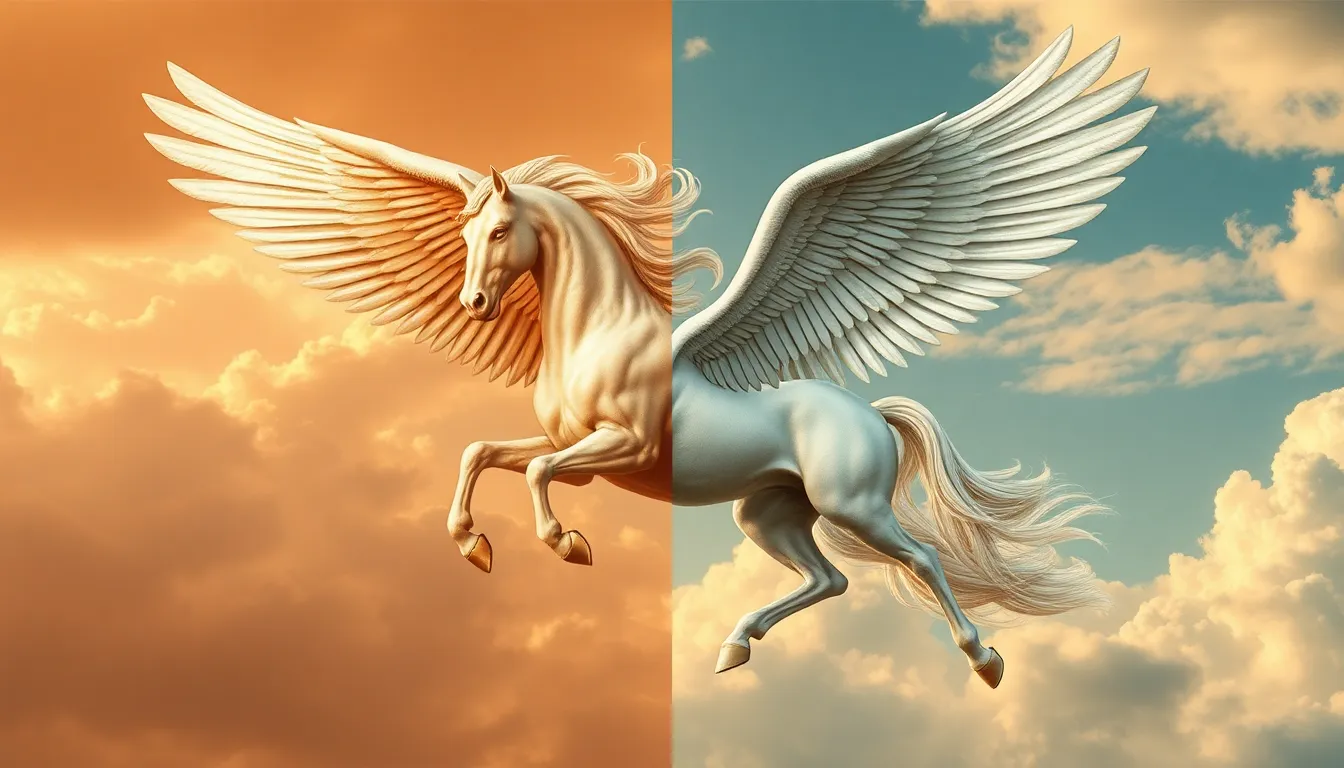The Evolution of Pegasus: How His Image Has Changed Over Time
I. Introduction
Pegasus, the magnificent winged horse of Greek mythology, has captured the imagination of countless generations. Born from the blood of the slain Medusa, Pegasus symbolizes not only beauty and grace but also the profound connection between the divine and the mortal. His image has evolved significantly over time, reflecting the changing values and beliefs of society.
Understanding the evolution of Pegasus’s image is crucial, as it reveals insights into how mythological figures adapt to cultural shifts. This article aims to explore the various interpretations of Pegasus throughout history, from his origins in ancient Greece to his modern representations in literature, art, and popular culture.
II. Origins of Pegasus in Greek Mythology
Pegasus’s origins are steeped in the rich tapestry of Greek mythology. He was born from the blood of Medusa, the Gorgon, when she was slain by the hero Perseus. His emergence was not merely a fantastical event; it held significant meaning in ancient tales.
- Birth and Significance: Pegasus is often associated with the Muses, the nine goddesses of the arts, and is said to have created the spring of Hippocrene on Mount Helicon by striking the ground with his hoof.
- Role in the Myth of Bellerophon: Pegasus is best known for his partnership with the hero Bellerophon, who rode him to defeat the monstrous Chimera. This alliance highlights themes of bravery, adventure, and the quest for glory.
- Symbolism of Freedom and Inspiration: The image of Pegasus soaring through the skies symbolizes freedom, transcendence, and the pursuit of artistic inspiration, making him a powerful figure in Greek lore.
III. Pegasus in Classical Art and Literature
As a figure of immense beauty and majesty, Pegasus was frequently depicted in classical art and literature. His image was immortalized in various mediums, showcasing the creativity of ancient artisans.
- Depictions in Ancient Pottery and Sculptures: Pottery from the Geometric and Archaic periods often featured Pegasus, illustrating his connection to mythological narratives and the gods.
- Representation in Epic Poems and Stories: In works such as Hesiod’s “Theogony” and Pindar’s odes, Pegasus is celebrated not just as a creature but as a symbol of heroic endeavor and artistic muse.
- Transition of Pegasus from Myth to Artistic Muse: As artists drew inspiration from Pegasus, he transitioned from a mere mythological figure to a source of creative inspiration, embodying the ideals of beauty and artistic achievement.
IV. The Renaissance Reimagining of Pegasus
The Renaissance marked a revival of interest in classical mythology, with artists and thinkers drawing upon ancient stories for inspiration. Pegasus was reimagined during this period, reflecting the humanist ideals of the time.
- Influence of Humanism on Mythological Figures: The Renaissance emphasized the importance of human experience and emotion, leading to more personalized and relatable depictions of mythological figures like Pegasus.
- Notable Artworks Featuring Pegasus: Renowned artists such as Sandro Botticelli and Raphael created stunning works that featured Pegasus, often portraying him in dynamic poses that emphasized motion and grace.
- The Emergence of Pegasus as a Symbol of Poetic Inspiration: During this time, Pegasus became synonymous with poetic and artistic inspiration, often depicted alongside the Muses in various artworks.
V. Pegasus in Modern Literature and Popular Culture
In contemporary times, Pegasus continues to be a popular figure, appearing in various forms of literature and media. His image has transformed, adapting to modern sensibilities and storytelling techniques.
- Contemporary Representations in Novels and Films: Pegasus appears in numerous fantasy novels and films, often portrayed as a loyal companion to heroes, symbolizing hope and courage.
- Role in Fantasy Genres and Young Adult Literature: With the rise of young adult literature, Pegasus has become a staple in fantasy narratives, appealing to a new generation of readers and dreamers.
- Transformation into a Symbol of Adventure and Heroism: Modern portrayals have solidified Pegasus’s role as a symbol of adventure, often associated with heroic journeys and quests.
VI. Pegasus in Advertising and Branding
The image of Pegasus has transcended mythology, finding a place in the world of advertising and branding. His iconic status has made him a powerful symbol for various corporations.
- Utilization of Pegasus in Corporate Logos and Branding: Companies like Mobil Oil have adopted Pegasus as a logo, leveraging his associations with speed, power, and reliability.
- Impact of the Image on Consumer Culture: The use of Pegasus in branding has impacted consumer perceptions, making the creature synonymous with quality and excellence.
- The Duality of Pegasus as a Mythological and Commercial Icon: This duality reflects the complexities of modern culture, where mythological figures serve both artistic and commercial purposes.
VII. The Digital Age: Pegasus in Technology and Media
In the digital age, Pegasus has found new life in technology and media, becoming a versatile symbol in various platforms.
- Representation in Video Games and Animated Media: Pegasus appears in numerous video games and animated series, often portrayed as a powerful ally or a majestic creature players can summon.
- The Role of Social Media in Shaping Public Perception: Social media has allowed for the rapid sharing of Pegasus imagery, contributing to the creature’s status as a cultural icon.
- Analysis of Pegasus as a Meme and Cultural Phenomenon: In internet culture, Pegasus has also become a meme, reflecting the creature’s adaptability and enduring appeal.
VIII. Conclusion
The evolution of Pegasus’s image illustrates the enduring legacy of mythological figures in human culture. From his ancient origins as a symbol of freedom and inspiration to his modern representations in literature, art, and advertising, Pegasus continues to captivate and inspire.
As we reflect on the significance of Pegasus, we are reminded of the power of mythology to shape our understanding of the world and ourselves. The story of Pegasus is not just a tale of a winged horse; it is a testament to the creative spirit of humanity and the timeless quest for beauty and meaning.




